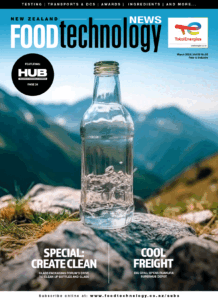By food futurist, Tony Hunter
I’m often asked what’s changed in the global Future of Food due to COVID-19? My answer is simple, everything… and nothing.
Everything because we’re in uncharted waters and much of what we thought we could rely on, like seasonal sales forecasts, is now obsolete and/or irrelevant in many countries. I’ve had a client in the UK tell me that they had a viable plan on a Monday morning that was irrelevant that night. In the short term much depends upon the country involved with the hardest hit enduring the most chaos and those more fortunate, like Australia and New Zealand, less so. But even the most fortunate countries have been significantly impacted in their retail and/or food service sectors. So, for much of the food industry, everything has indeed changed.
Nothing is the long-term view when we’re talking about a time horizon of decades. Does it matter from our 2020/21 perspective whether something happens in 9, 10 or 11 years or 19, 20 or 21 years? As we get closer then yes, a year’s error does make a difference but measured against decades, no. This is the situation when we talk about the long-term future of food.
So how do we know that nothing has changed in the long term? One way is to look at the technological drivers of the future of food and see how they’ve fared under COVID-19. Have they been sidelined or rendered irrelevant? If they have been, then the future of food will indeed have been fundamentally altered, but if the answer is no, then we’re still on the same track as pre-COVID. So, let’s have a brief look at what’s happened so far in 2020.
- Alternative proteins
If anything, alternative proteins have been front and centre as people grapple with the zoonotic (animal origin) nature of COVID-19. Plant-based businesses have flourished, with Impossible Foods now in 11,000 stores in the US, Beyond Meat opening two new manufacturing plants in Shanghai and NotCo raising USD$85 million to expand into the US and other markets. Cultivated meat has seen major advances even in these chaotic times. These 2020 advances include, Mosa Meat raised USD$75 million series B funding, Aleph Farms released its prototype thin steak, BluNalu still being on track for the 2021 opening of its pilot plant and Singapore approving Eat Just’s chicken product for sale.
Relevance – unchanged to accelerated
- Microbiome
Investigation of the human microbiome has accelerated enormously over the ten years from 2009 to 2019. In 2009 some 1,500 papers were published, rising too some 9,500 in 2019 and the trend shows no sign of slowing.
The Predict microbiome study continues to produce groundbreaking research, showing amongst other things that;
- Only approximately 50% of an individual’s glycemic response is genetic.
- 15 bacterial strains are consistently associated with good health and 15 strains of bad health.
- There’s a huge variation in twin responses to food.
The end goal of the study is to develop a home test and app that will allow people to understand their individual responses to foods and optimise their nutrition and metabolism.
Major companies are showing commercial interest in the microbiome, with DuPont Microbiome Venture and P&G teaming up in 2020 to develop next-gen probiotics for human health.
Startup funding has still been active in the space, including microbiome companies BitBiome raising USD$6.6 million Series B and Sun Genomics USD$8.65 million Series A funding.
Consumers are also turning to pre-and probiotics to improve their gut health and “boost” their immunity in the face of potential COVID infection.
Relevance – accelerated
- Genomics
CRISPR gene editing hits the stage again with a study showing that it may be possible to remove a person’s fat and transform it into brown, fat-burning cells. Could it be bye-bye obesity?
As an example, on the commercial side DNA nutrition testing company GenoPalate and recipe company Edamam have partnered to make it easier for consumers to choose healthy recipes suited to their individual genetic profile.
CB Insights project that investment by their Smart Money VC investors are set to exceed both 2018 and 2019s investments at some USD$1.67 billion in 2020.
Relevance – accelerated
- Synthetic biology
This sleeper technology (at least as far as consumers are concerned) capable of fundamentally changing the world as we know it has been just as active as ever in 2020. Over USD$3 billion of equity investment was made in the first half of 2020 vs USD$1.9 billion for the first half of 2019.
In the food sector, Geltor raised USD$91.3 million Series B funding to further its fermentation collagen product. It also has an agreement with conventional gelatin company Gelita to commercialise the product. Expect to see their ingredients in dietary supplement products in 2021.
Relevance – unchanged to accelerated
Looking at how our technologies have fared I think it’s reasonable to say that they’ve proven their ongoing relevance and resilience. Even in the face of a pandemic many of them have been accelerated. So, as we can see, while everything has changed in the short term nothing has changed in the long-term future of food.
But what will this mean for the food industry in 2021? I don’t usually indulge in short term predictions but given how strange 2020 has been I think I’ll have a go in our January 2021 newsletter.
Tony Hunter is a global futurist, food scientist, speaker and foresight strategy consultant. He consults and speaks globally, using his distinctive combination of scientific qualifications, business experience and detailed understanding of exponential food technologies to deliver a unique perspective on the future of food.



































































































